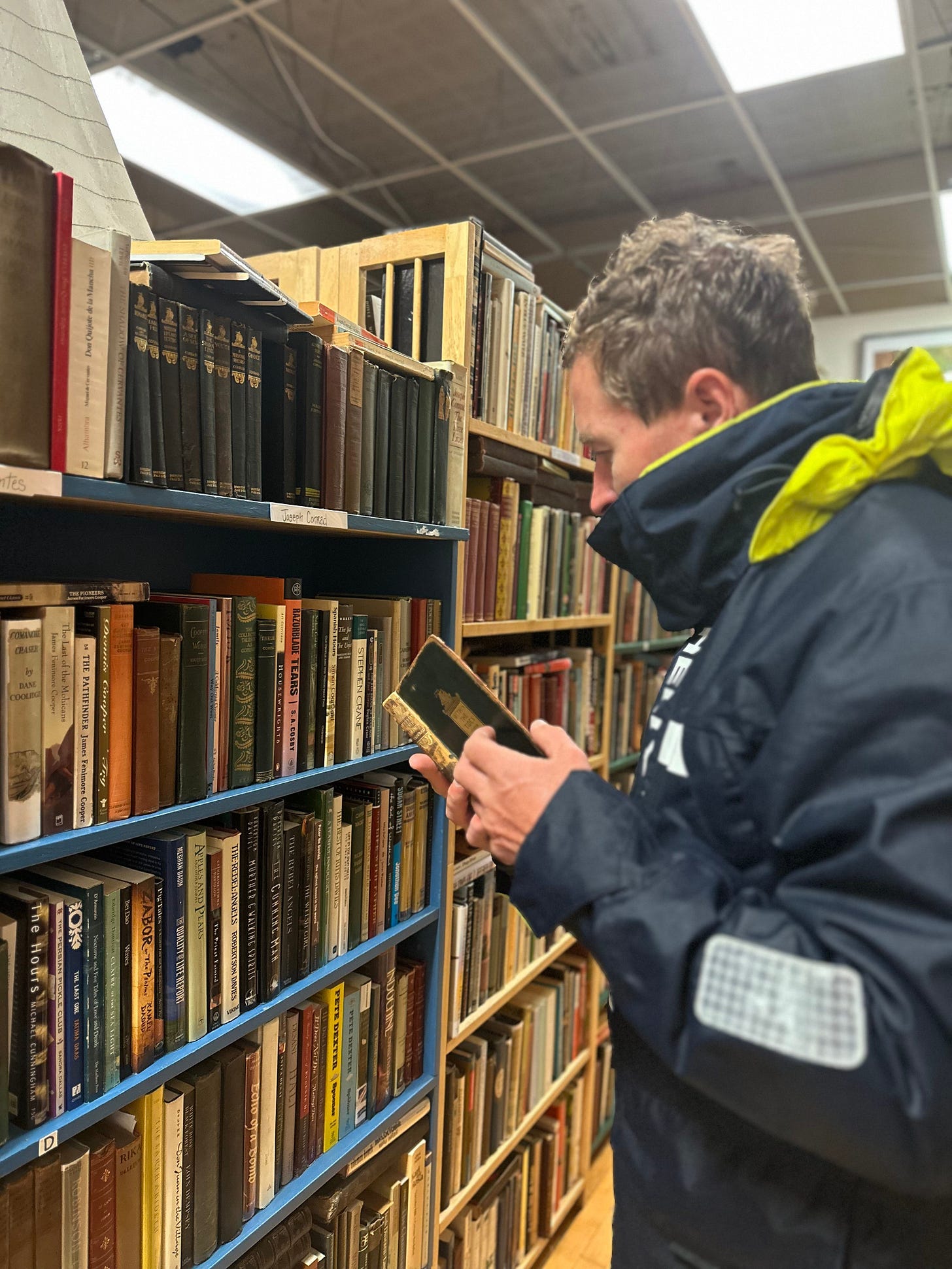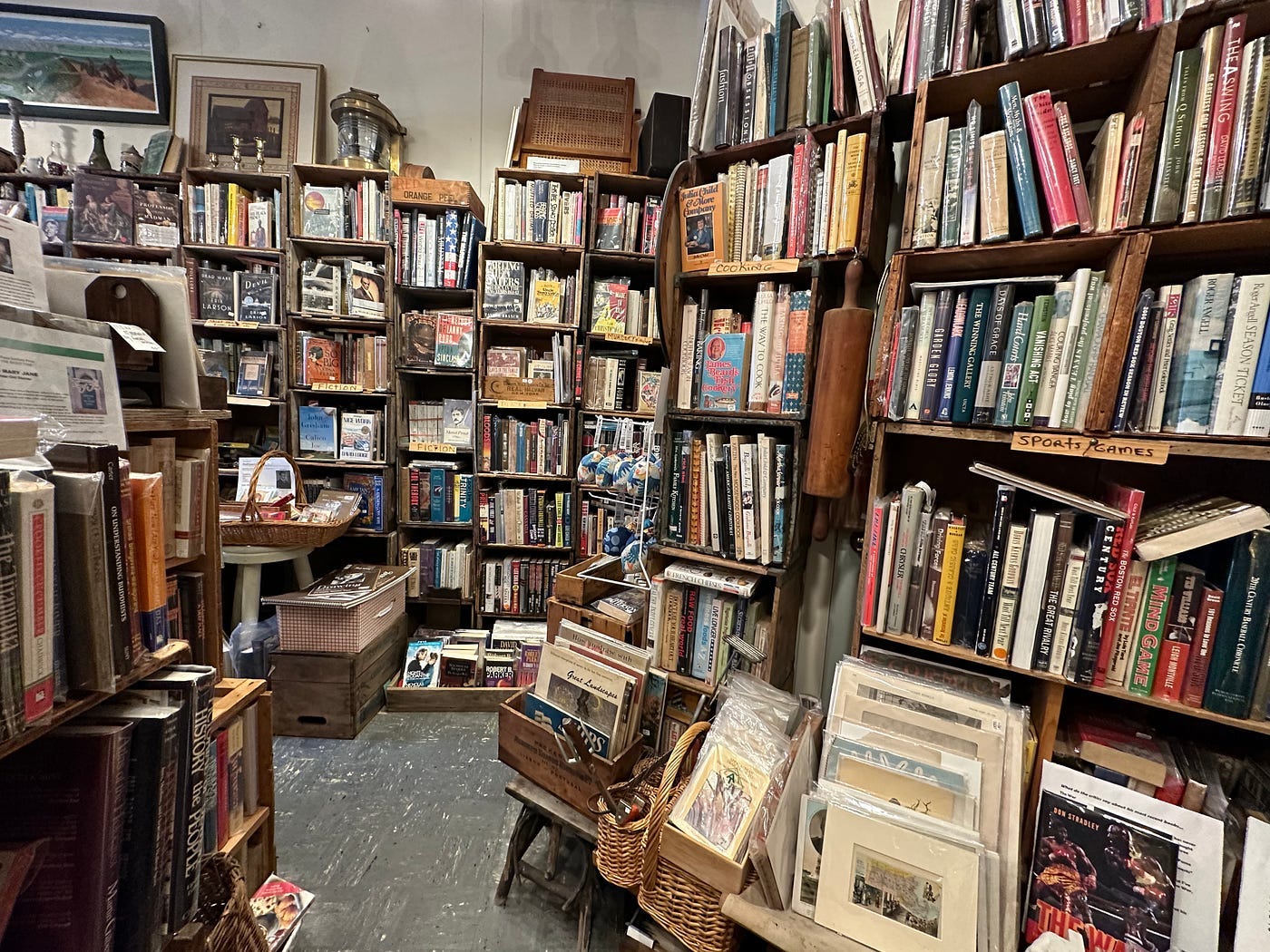Chance a Used Bookstore, Change Your Life
Essay. How a random book can launch a new chapter in a life
No one buys books, they say. But it is a lie. This store in Provincetown, Massachusetts, is full of books and people. Books are squeezed into the shelves, and people are squeezed into the aisles between them. People tussle, press, apologize, and cram their bodies into nooks, hoping to be unbothered long enough to leaf through their finds.
They add each book to a small stack, then shuffle it in the vain hope of selecting one to buy, give up, and, with the full stack, they queue by the cash register as old as Nixon’s lies. Why not buy the entire stack? It is only dollars for each tome.
When it is my turn to pay, I see no one behind me, so I ask the man if it is his shop. He nods and says it has been all along. He is not young, nor is he very old. I cannot tell his age, but I wonder if he bought this register as new.
I am happy to see the store so busy, I tell him. He agrees, then says it is a Saturday. Anomaly? I ask. He nods again. “The Bear Fest is in town, a big gay celebration, and gay people here like to buy his books,” he says. Could such a store be as busy anywhere else? I ask. He shakes his head. “No, quite unlikely.”
I fear it is true. I made it a hobby to seek out used bookstores on my travels. I have seen a few in the two months it took us to slowly sail up the coast from Key West to Provincetown. They all had charm, the musty smell of books, and someone who knew the location of Conrad’s stories among the clutter on the shelves. They all had souls, but seldom the customers in numbers for the arithmetic of sales to add up to a comfortable living.
The statistics are against such stores. Of the 5,500 independent stores in the 1990s, only 2,500 remain. The others died of progress and of the human rush for the convenience of size or Amazon delivery.
I understand. I buy on Amazon and refill my Kindle. We all do. I surrendered to the imposed imperative to gather subjective facts attached to book titles in the databases of online retailers. I read reviews, compare rating stars, and buy only books with a readership large enough to validate my choice. Why take risks? The crowdsourced critique cannot be wrong, can it? It will filter trash, and only rarely will a literary imbecile climb the charts.
But here is the fault: crowdsourcing rewards generalities. It buries thoughts written for specific minds. Yours. Hers. His. Theirs. True, we share much, and many of our experiences are common. But we carry a kernel of uniqueness born of tribulations descending upon us in a particular sequence, which forges our personality. Only a few others may relate. If one of them writes a good book, only a few may like it. It is exactly right for them. It may be exactly right for you. But who buys a book with two reviews? I don’t. Do you?
Instead, I scan through books selected for me by an algorithm finely tuned to my weakness. It does not care that I learn; it cares that I buy. So I see the well-rated books and buy them to protect my money and my time. They are good books. Some are great books. They speak to universals we all share, but they seldom reach into the attic of our minds, that space filled with the junk and treasure that gives each personality its history, color, and depth.
But in a used books store, you may stumble on a book that opens attic doors.
A few years before then, I am in another store. Besides the staff picks, the books do not display reviews. They show no rating stars. They are just spines with names. I like one with an embossed foreign name on a textured charcoal spine. I pull it from the shelf. Bernard Moitessier? A new name for me.
I leaf through pages and read fragments of the paragraphs. He writes of the sea. A phrase, then tone and cadence capture me, and I want to read on, but the store is closing. I carry the book to a sallow man. He peels off the sticker, five-ninety-five, and sends the book with me in a paper bag without handles.
Bernard Moitessier lives on my shelf, unread for years before I reach for it again. On a whim, while waiting for my girlfriend to get ready to leave the house on our Friday date, I reach from the couch and pull the book off the shelf, only because it is right there. I leaf through it and wonder how I have forgotten it.
The next day, I read it all, and it reminds me of a world much bigger than my office chair and the robotic production of improved bottom lines. It reignites a dream and teaches how to save my soul.
That office chair is now in the past. Today, a seat at our sailboat helm is where I do much of my thinking. A life turned upside-down by a used charcoal book pulled from a store shelf I don’t remember. At random. Without an algorithm. Without counting the stars or reading the reviews. Picked by only listening to my own voice, mumbling between cramped shelves, reading fragments of Moitessier’s dreams.
Take a chance sometime in a used bookstore. There are more of them now. Yes, the numbers are growing again. Who would have thought? And one may change your life.





Your post truly resonated with me and my love of books; I have yet to even go Kindle! Used books have additional character, I think, because someone put it back into Circulation. You and I have probably haunted the same establishments! I am a self published author as well as Substacker. My books don't have big numbers and you are correct, I sell a few here and there....it's a tough cycle and I know, at the risk of sounding arrogant, that my memoirs could make an impact. There are lots of great writers in the world. The paths are never the same....
It is becoming apparent to me that what books succeed is determined by luck and marketing. The quality and power the books deliver is a requirement but seemingly a secondary one. It is dispiriting, but also unsurprising. Everything is a business nowadays, even art.